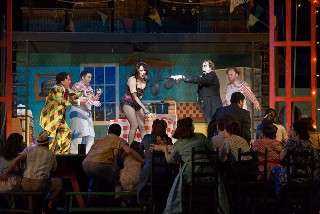|
Back
Cav/Pag Time Warp New York
Metropolitan Opera
01/21/2016 - & January 25, 28, February 2, 6, 10, 13, 17, 20, 23, 26, 2016
Pietro Mascagni: Cavalleria Rusticana
Yonghoon Lee (Turridu), Violeta Urmana (Santuzza), Jane Bunnell (Mamma Lucia), Ambrogio Maestri (Alfio), Ginger Costa-Jackson (Lola)
Ruggero Leoncavallo: Pagliacci
George Gagnidze (Tonio), Roberto Alagna (Canio), Tony Stevenson (Beppe), Barbara Frittoli (Nedda), Alexey Lavrov (Silvio)
The Metropolitan Opera Orchestra and Chorus, Fabio Luisi (conductor)
Sir David McVicar (production), Rae Smith (sets), Moritz Junge (costumes), Paule Constable (lights), Andrew George (choreographer)

(© Marty Sohl)
Sir David McVicar continued his reign as the closest thing the Met has to a house director last season when his Cav/Pag replaced yet another storied Franco Zeffirelli production. The new effort has not settled in as one of the director’s greater successes, however, and its revival last night displayed an odd unevenness. The conceit is that both operas happen in the same village a few decades apart, with Cavalleria Rusticana set in the late nineteenth century and Pagliacci following in the 1940s. The action thus unfolds before high reddish-beige (beige?) walls that suggest a prison, factory, or some other kind of confining institution that condemns the characters to their pathetic fates. The cliché of the wall and its suggestion of entrapment is easily recognizable to anyone familiar with soi-disant "avant garde" European directors and their collective lack of imagination, but it is unclear how Sir David’s reliance on phased temporality serves either work. In some ways it actually imposes limitations. If Pagliacci happens in the 1940s, then it must logically follow that the townspeople enjoy a more visually interesting life than their ancestors did in Cavalleria. Here this is suggested by a bellowing truck that carries around the company of itinerate actors, an improvised electrical tower, and brighter period costumes. Making Cavalleria more retrograde forces the direction to eliminate these elements, leaving a chorus dressed in severe black with nothing but rough tables over which to pour out their disappointments. The only hint of color arrives during the "Innegiamo" hymn aria and chorus, but here the iconographic religious statues offer little corrective relief. McVicar seems to have compensated with the use of the Met’s rotating stage, but here, too, the temporal limitations were too great to save the concept. While its subtler use in Pagliacci allows for effectively subtle changes in angles and sightlines, in Cavalleria it simply spins the seated chorus around in a bewilderingly pointless whirl. One might be forgiven for concluding that the production’s principal message was that the southern Italian peasants were happier under Mussolini.
The vocal efforts paralleled the visual and dramatic unevenness. In Cavalleria it was hard to take the wan voiced Violeta Urmana very seriously in the role of Santuzza, whom Turridu has impregnated and thrown over for the married Lola. The role requires more youth, naivety, and susceptibility than a dramatic soprano past her prime can really muster. The overall effort was reduced to a pallid sulk that conveyed little pathos. Yonghoon Lee’s more successful Turridu radiated some clarion high notes but seemed out of place in such a dull village. The solid baritone Ambrogio Maestri sang well as Alfio, Lola’s wronged husband and Turridu’s killer, but seemed a bit miscast from his more legendary comic characters. Pagliacci, however, soared with the immensely talented tenor Roberto Alagna as the cuckolded clown Canio and the fragile Barbara Frittoli as his faithless Nedda. George Gagnidze’s stentorian baritone, heard earlier this season in the title role of Verdi’s Rigoletto, captured the treacherous Tonio, who maliciously reveals Nedda’s affair after she spurns him, with a baseness redolent of the nastiest stage villains. Fabio Luisi led a measured performance, though at times, particularly in the more soaring moments of Cavalleria, the orchestra sounded rather too restrained.
Paul du Quenoy
|